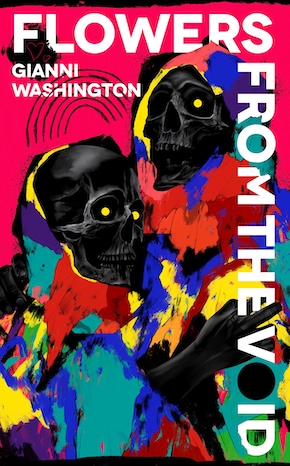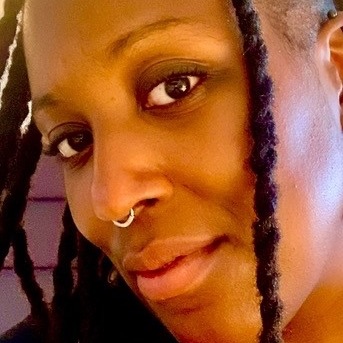Homunculus
by Gianni Washington
“Her hair was blonde, but more white-blonde than yellow, see?”
Charles focuses on where the man’s shaking finger stabs the photograph. Its subject is wrapped in a red sundress with daisies vivid enough to be real raining diagonally across the fabric. Strands fly loose from her ponytail like wisps of raw cotton in the wind. Her mouth is bright with laughter, her green eyes mushed into semicircles by full, pink cheeks. She’d had a nice face, a kind one, that was likely quite plain and smooth as milk when not decorated by a smile. He wonders where the photo was taken. Clearly not within city limits, as there are no stacks belching white mist, or tinkerers flogging robotic limbs made to replace those lost in the Great War. Only hills that seem to rise and fall infinitely, back and back and back, under a sky so clear of smog it almost hurts to look at it. Charles pinches the bottom corner of the photo between index finger and thumb, attempting to take it for reference. The man resists for a moment before letting the picture slip from his grasp. His fingers extend briefly before curling in on themselves.
“Can you do it?” the man asks.
“Of course,” Charles says, a bit flippantly. Then, seeing himself reflected in the man’s eyes, he says, “Yes. Yes, I can.”
The smile given in response – full of relief and hope – might have been enough to sate a man with no cares to speak of. But Charles has a home to maintain, and is thus forced to ask for payment.
—
The bodies slump in the corner, their empty eye sockets gaping at nothing in particular. Arms, legs, fingers entwine. This immobile audience oversees Charles at his work, silently critical. He presses the faux skin to its muscle and bone gently, gently. He must wear gloves. It is paramount that the ridges in his fingertips do not infiltrate the surface of the doll; the figures must at least appear to be of nature’s making. After completely clothing one arm in a pallid sheath of fake skin, Charles removes one glove and shakes the open hand with his eyes closed, careful not to squeeze too tight. Yes. He could indeed be palm to warm palm with an actual young lady. Success. Now, on to the rest of the body.
“You can’t keep doing this,” Esther says. She peeks over Charles’s shoulder and gazes at him from the creased corners of her eyes. Ebony hair jumps loose from her generously pinned head to fill the space between her eyebrows. She uses a finger to bury the mutinous strands more deeply inside the bouquet of coarse curls straining to blossom from her head.
“I know,” Charles says, but keeps working. His client had made a down payment after all.
“It won’t help him. In the end,” she says. Her vacant eyes rove his workspace. Bins brim with synthetic hair. Eyes made of resin nearly spill from an open drawer, their glossy irises brown, blue, hazel, green, and gray. Charles fingers the bodiless arm delicately. It is coated in a self-heating substance, with firm rubber muscles swaddling plastic bones. Charles uses a time-tested mixture of additives with silicone sourced from specialty retailers. It had taken him over a decade, but he’d finally hit upon the perfect combination of ingredients to make the skin of his creations feel eerily human. The earlier models were passable, but this is a level of realism he never imagined achieving. If he had not forfeited most of his too-long life to this trade, which could only be whispered about in deserted rooms and alleyways narrow enough to be missed by the peering occupants of airships, he could almost feel proud. As it is, he feels only a penetrating weariness.
Esther turns her head on her thin neck to look at Charles. She rests her round, little-girl chin upon his shoulder. “Did it help you?” she asks.
“I’m not lonely anymore, am I?” he answers. He presses a plastic fingernail hard against the drop of glue meant to fasten it in place. Esther watches an angry pink glow through the viewfinder of Charles’s thumbnail. He releases the pressure. The pink softens to a pale peach. “I can’t imagine my life without you.”
A slow grin crawls into place beneath Esther’s nose. “Of course you can.” She kisses the hard salt and pepper stubble on his cheek. If she had any blood, her pricked bottom lip would grow a single bead for her to lick away. “That’s why I’m here.”
Like every day since the one on which her eyes first clicked open and locked onto his in recognition, Esther is right. She is always right.
He would have made Esther a doll out of his own mottled skin had she asked. He would have done anything. Absolutely anything.”
In bed at night, his body yearns for hers. Running a hand across the sheets, he imagines catching hold of her warmth, but Esther has her own room downstairs. She does not require sleep, but enjoys her privacy nonetheless. She is not the one who once shared his bed, whose hips and shoulders wore the neon outline of the sun so elegantly every morning when he opened his eyes, so Charles does not – will not – allow desire to rupture the borders of his own body. Sometimes, when he passes her closed door, Charles hears Esther speaking softly to Madeline, the doll he made for her out of burlap stuffed with handkerchiefs after months of Esther crying for a companion of her own. With every stitch, jealousy had eroded him further. Was he not enough? That’s not what she meant and he knew it, she’d said. So he finished cobbling Madeline together out of the least appealing materials he’d had to hand in hopes that Esther would feel the lack and crave his touch instead. But Esther was quite satisfied with Madeline as she was. He would have made Esther a doll out of his own mottled skin had she asked. He would have done anything. Absolutely anything.
—
“Thank you! Oh, thank you!”
“Hello, Daniel,” the doll says to the overjoyed man. Her hair is more white-blonde than yellow, and her unsmiling face is as smooth as milk. She looks like the woman in the photograph as a child on the cusp of womanhood, and always would. The adult-sized models never functioned properly for long, so Charles stopped making them in favor of smaller models with longer lifespans. The people who came to him did not mind, for they were so hungry for a glimpse of their lost loved ones that any version of them would do. His latest creation looks upon her new guardian with eyes unclouded by mistrust. Her clockwork heart is too young to doubt – him, or anyone.
“I can’t begin to thank you,” Daniel says to Charles.
Would it help him in the end? After the initial burst of joy at his beloved’s return subsides, Charles knows that, in time, a new platoon of emotions will creep in under the cover of Daniel’s cheer. Questions he never thought to ask will claw up to confront him, no matter the excess of unspent love he showers upon her to distract himself. Now that she’s here, what will you do with all that pain? Is it best saved for later? Because the doll will die. But what will happen to her if it’s you who goes first this time? What does she want to happen? However close the resemblance, she is not Her, and you can never know this heart so well as the one you buried. Will you look back on this day and those that follow with ecstasy, or regret? Over many years, Charles had prepared three answers to that last, most important question: the one he would give a customer, the one he would give a colleague if he had one, and the one he knew in his heart to be true.
Well. One can hurl shoulds into the wind forever.
“I’m… glad you’re satisfied,” Charles replies. He dons a small smile like a costume. Let Daniel figure out the answers on his own. Who knows – maybe they’ll be different. Charles will never know either way.
Daniel hands Charles a pouch heavy with coins and leaves the café, arm-in-arm with his new, old friend. She laughs as the bell above the closing door tinkles.
—
He had assumed he would forget her eventually. The mockingly large eyes, a brown as light as decaying autumn leaves. The way she held utensils when she ate. Laughter that was always hesitant to be heard. Dark hair like wool that somehow always sprang loose to fall into her eyes regardless of how steadfastly she pinned it. The deep slant of her vowels rolling up out of her full-lipped mouth. A slant that had regrettably straightened out with each new pair of vocal cords. Surely the finer details should fade over time. But everything she had been is still as crisply imprinted upon him as on the day they first met – the lines and colors sharp enough to sting – and he refused to let them wink out of knowing. Those who learned of his occupation and requested this service of him were only ever allowed one doll. When it died, that was that. He refused to let anyone else live out their days in the particular Hell he had cultivated for himself until it bloomed, soft, agonizing and infinite. Infinite because every time she died, he rebuilt her.
“Esther,” Charles says later that night. “Do you wish for another life?”
“No,” she answers, to his great relief. “I can’t imagine a life other than the one I have.”
“You can have any life you choose,” he says. His words are jagged. Pained.
She stares at him with the fourth pair of eyes ever to look at him that way. An eternity elapses. “I choose this life,” she says finally. “I know you feel an emptiness, and I am happy to fill it.”
Charles’s mouth contracts to its smallest point. “I don’t need you to fill my empty spaces. I want you to be happy,” he says. Maybe, if he repeats the words often enough, they’ll become true. Wood into flesh. No puppeteering required.
“It’s alright,” Esther says. Her voice is flat, but not unkind. “I don’t mind that you need me.”
This he cannot deny. The missing will never reach its end, because he will never let it. “I’ll give you anything you ask for,” he whispers, his misery and ecstasy enfolding one another in a consumptive embrace. She brings her elfin hand up to his face and smiles.
“I ask only for this life. With you.”
from the collection Flowers From the Void (Serpent’s Tail, £14.99)
—

Gianni Washington’s writing has been published in The Fat City Review online, LitroNY.com, the horror anthology Brief Grislys and read aloud on the Great American Folk Show. She is a monthly contributor to the Chicago Review of Books and holds a PhD in Creative Writing from the University of Surrey. She worked for many years as a bookseller in London and is now based in North Carolina. Flowers From the Void is published by Serpent’s Tail in hardback and eBook. An earlier version of ‘Homunculus’ was published in L’Esprit Literary Review.
Read more
Instagram: kaonashigigi
@serpentstail

